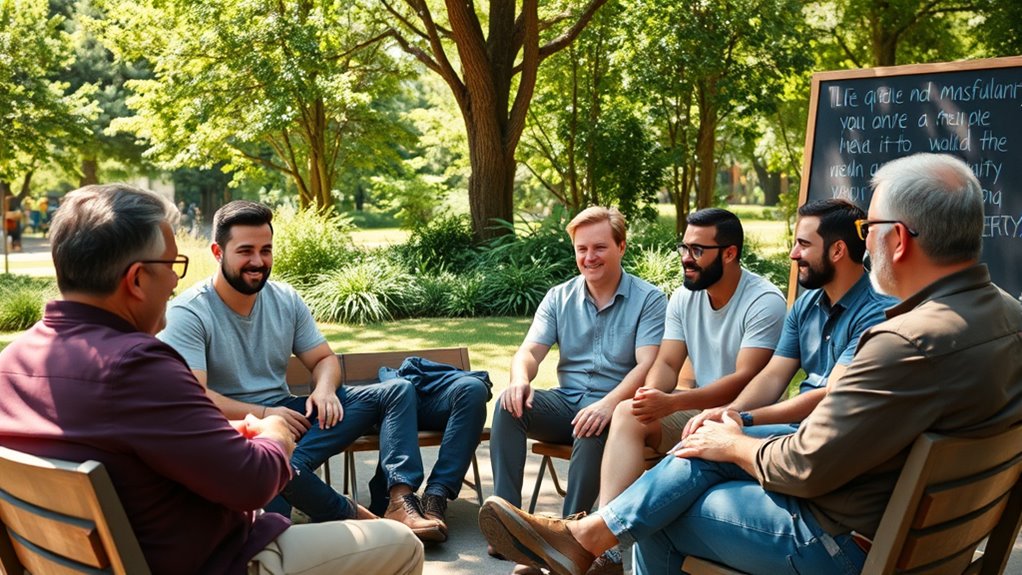Toxic masculinity often promotes the myth that men must be tough, unemotional, and dominant, which can harm mental health and relationships. Real strength includes emotional openness, vulnerability, and compassion. Challenging these stereotypes helps create healthier self-empowerment and genuine connections. By understanding these myths, you can foster positive dialogues and promote more inclusive ideas of masculinity. Keep exploring to discover how shifting perceptions can lead to a more balanced, respectful society.
Key Takeaways
- Challenging myths reveals that emotional expression is a sign of strength, not weakness.
- Promoting open conversations helps dismantle harmful stereotypes and fosters understanding.
- Recognizing caring and vulnerability as core aspects of masculinity broadens societal definitions.
- Cultural practices like traditional tea ceremonies highlight emotional awareness and respectful connections.
- Embracing healthy masculinity improves mental health, relationships, and creates a more inclusive society.

Have you ever wondered what toxic masculinity really is and whether it’s truly a part of being a man? It’s a question many people ask as they hear about the negative behaviors associated with masculinity, but the answer isn’t as straightforward as it might seem. Toxic masculinity often stems from rigid gender stereotypes that society has ingrained over generations. These stereotypes suggest that men should always be tough, unemotional, and dominant, which can create harmful expectations. One of the biggest issues is how these stereotypes suppress emotional expression. Instead of showing vulnerability or discussing feelings, many men feel pressured to hide their emotions, believing that doing so makes them weak or less masculine. This emotional suppression doesn’t just hurt individual men; it also impacts their relationships and mental health. It’s important to recognize that expressing emotions is a human trait, not a gender trait. When you suppress your feelings, you reinforce the false idea that masculinity equals emotional stoicism. Challenging these gender stereotypes is key to fostering healthier ways of being a man. You don’t have to conform to outdated ideas that equate strength with silence or indifference. Instead, you can embrace emotional expression as a sign of strength and authenticity. By encouraging open conversations about feelings, you help break down the harmful notions that have long defined masculinity. It’s also essential to understand that these stereotypes limit everyone, not just men. They create unrealistic expectations that can lead to issues like mental health struggles, violence, and difficulty forming genuine connections. Promoting positive dialogues about what it means to be a man allows you to question these stereotypes and redefine masculinity on your own terms. You can show that caring, vulnerability, and emotional openness are qualities of real strength. Challenging toxic masculinity involves recognizing that emotional expression isn’t a sign of weakness but an essential part of human experience. When you talk openly about emotions, you help dismantle the harmful beliefs that have been passed down through generations. Additionally, understanding the impact of societal expectations can be informed by exploring traditional tea ceremonies, which emphasize mindfulness, respect, and harmony—values that encourage emotional awareness and connection. The goal isn’t to abandon masculinity but to transform it into a more inclusive, healthy concept that celebrates authenticity and emotional well-being. By doing so, you contribute to a society where men can be their true selves without fear of judgment or shame. This shift benefits everyone, making it possible to build relationships based on honesty, empathy, and mutual respect. Ultimately, understanding that masculinity isn’t about suppressing emotions but about embracing them can lead to a more balanced, compassionate world.
Frequently Asked Questions
How Can We Measure the Impact of Toxic Masculinity on Mental Health?
You can measure toxic masculinity’s impact on mental health by observing changes in emotional resilience and help-seeking behaviors. Track how often individuals open up about feelings or seek support, and assess their ability to cope with stress. Surveys, interviews, and mental health screenings can provide data on emotional well-being. By analyzing these indicators, you’ll see how toxic masculinity influences mental health and identify areas for positive change.
What Role Do Media and Pop Culture Play in Shaping Masculinity Myths?
Media influence and pop culture are like mirrors reflecting society’s expectations of masculinity. They shape myths by showcasing tough, emotionless heroes or aggressive stereotypes, which become ingrained in your mind. When you consume these images, you may feel pressured to conform, hiding vulnerability. Recognizing this, you can challenge these stereotypes, embracing authentic masculinity that values emotional expression and kindness over outdated notions of strength.
How Can Workplaces Promote Healthier Masculine Identities?
You can promote healthier masculine identities by encouraging open discussions about gender roles and emotional expression. Create a workplace environment where everyone feels safe to share feelings without judgment, and challenge traditional stereotypes that equate masculinity with stoicism or dominance. Provide training on emotional intelligence, support diverse expressions of masculinity, and recognize efforts that foster respect and inclusion, helping all employees embrace a more positive, balanced view of masculinity.
Are There Cultural Differences in Perceptions of Masculinity?
Yes, there are cultural differences in perceptions of masculinity. You’ll notice variations in cross-cultural norms and gender role variations, which influence how masculinity is expressed and valued. In some cultures, strength and stoicism are emphasized, while others prioritize emotional expression and nurturing qualities. Recognizing these differences helps you understand that masculinity isn’t universal but shaped by cultural context, fostering respect and more inclusive conversations around gender.
What Strategies Help Men Challenge Traditional Gender Stereotypes Effectively?
Sure, because who doesn’t love a good challenge to gender role stereotypes? You can start by embracing emotional expression, breaking free from the “tough guy” mold. Challenge traditional notions by questioning societal expectations and seeking out supportive communities. Use positive dialogues to connect, share experiences, and normalize vulnerability. Remember, changing perceptions isn’t about perfection, but progress—one conversation at a time, turning clichés into new, healthier narratives.
Conclusion
By challenging toxic masculinity myths, you help create a healthier, more inclusive environment. Did you know that men who embrace emotional expression are 50% more likely to report higher well-being? When you encourage positive dialogues, you foster understanding and break down harmful stereotypes. Remember, redefining masculinity benefits everyone—yourself included. So, keep questioning, listening, and speaking up. Together, you can build a future where strength is measured by kindness, not suppression.









